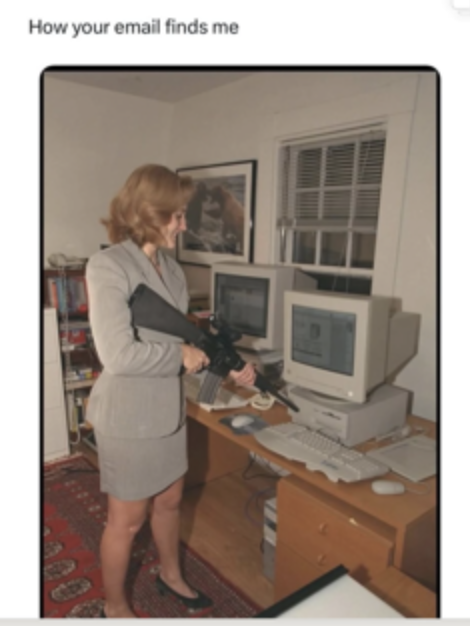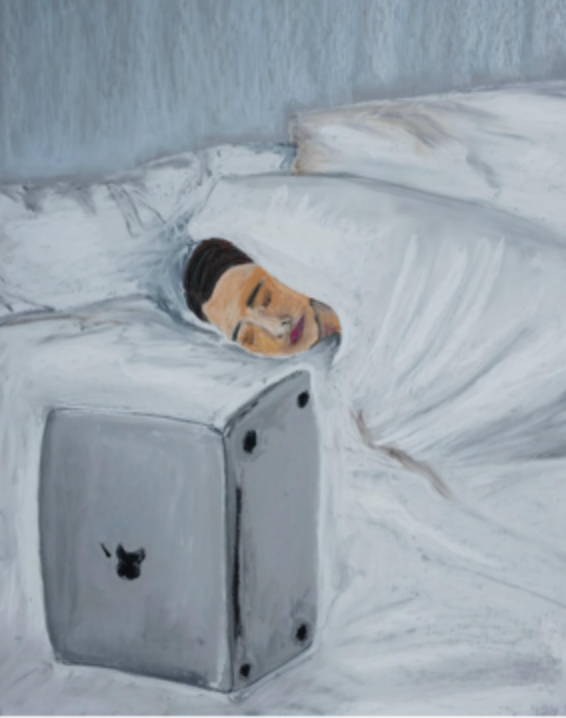Look at what the Kat dragged in - 04/25
Greetings from aboard a train speeding me, my smallest carry-on luggage, and my newfound appreciation for Alan Parsons Project and Rod Stewart toward Munich. These days, I´m mostly occupied shepherding panel discussions featuring accomplished scientists, terrified of having to unite their wandering thoughts into coherent analysis of the present. Unrelated I´ve also impulsively purchased 20 of the 50 "SPIEGEL best books of the past 50 years," from Medimops for just 60 bucks—so I'll likely vanish into exploring them until year's end. (The pages carry a certain weight, and hopefully, the thoughts within do as well.)
In Munich, I can recommend this show at Amerikahaus: It brings together artistic research exploring Munich after 1945 and how post-war conventions still influence contemporary life. Nine artists investigated local archives to visualize aspects of the postwar era, including reconstruction of social spaces, authority, and educational re-education concepts. I was a MessyHistory / Caroline Anne Kapp -stan already (Hi Friend!)- and discovered my affinity to Swiss artist Thomas Galler and the Diensthundestaffel Allach anew: https://www.instagram.com/t_h_o_m_a_s_g_a_l_l_e_r/

1) Things we missed:
Panel: Google, Apple & Co: From Tech Giants to Financial Behemoths?
Corporations like Apple, Google or Amazon are consolidating the market more than ever, accrueing wealth and (digital) value chain dominance. Their newly wielded alliance with the Trump administration threatens to cement their status further. As they are increasingly expanding into the financial sector, growing their range of services, like payments and loans- with their main trade in Europe being digital wallets such as Apple Pay (for now)- GAFAM could scale this business swiftly, with dire consequences for consumers, competition and European sovereignty. The Finanzwende Recherche-project "Big-Techs in the World of Finance" looked into associated risks and political counter-strategies - reports are available here: https://www.finanzwende-recherche.de/unsere-themen/digitalisierung-finanzsektor/big-techs-im-finanzwesen/
The Dynamic Memory Lab: »Cycles of Decolonisation« on Food Delivery Platforms:
An intervention in a park directed the visitors gaze to the continuities of European colonialism: Using the example of Food Delivery Riders, a trade rich with exploitation dynamics, it uncovered the contemporary manifestations in which the legacy of European colonialism persists - seeking to dismantle the habitual invisibility associated with dehumanisation.
Panel: "Wirtschaftspolitik neu denken: Schritte zur Dekolonisierung"
The launch event for the publication “Wirtschaftspolitik neu denken” focused on discussing how economic policy can be reimagined from a decolonial perspective within the capitalist system. The debate addressed ways to engage with colonial histories and their ongoing effects in order to reduce current economic and social inequalities. Key questions involved identifying necessary conditions for overcoming continuities in the global economy and exploring methods to dismantle unequal economic structures.Mapping Lessons and Terror Tales by Philip Rizk @ Wolf Kino (More info: Harun Farocki Institut Editorial Statement)
As part of the HaFI project "Terms and Conditions- The Legal Form of Images," director Philip Rizk discussed his essay films Terror Tales (2024) and Mapping Lessons (2020), exploring (neo)colonial violence through audiovisual archives, interrogating the processes of mapping, erasure, and redrawing geopolitical boundaries, particularly in the context of the so-called “Middle East.” Terror Tales examines how images construct narratives of terror, reinforcing systemic racism, from the myth of the American Dream to Zionist violence in Palestine, while Mapping Lessons juxtaposes historic and ongoing global struggles—from Vietnam and Angola to Palestine, Syria, the Paris Commune, early Soviet Russia, and Spain in 1936—to highlight methods of resistance and possibilities for future social transformations.
Embedded: The Military as a Patron of the Arts (Conference)
This interdisciplinary conference, building on a prior workshop, explored the historical and contemporary role of the military as patron of the arts. It discussed examples such as the Soviet Grekov Studio, the Wehrmacht’s Squadron of Visual Artists, and the U.S. Army Combat Artists Program- dissecting how military patronage has shaped artistic styles, themes, and cultural tastes across painting, sculpture, architecture, film, music, dance etc. Moving beyond the familiar concept of "artists in uniform," the conference focused on deeper questions: why militaries support specific forms of art, how such art is valued, and its reception by various audiences—including artists, critics, military communities, and the general public, combining perspectives from history, sociology, and art history.

Cemile Sahin, Roadrunner @ Esther Schipper
Polymath Cemile Sahin employed the colorful, staggering visual language of video games to address contemporary political topics, among them the use of drones by corporations, authoritarian regimes, and the military- speaking about family and loss, as well as about the technologies facilitating digital disembodiment and political oppression.
Das kommende Denken: Post-Kolonialismus und Französische Theorie @ Diffrakt
"French Theory" has both a neglected colonial past and an overlooked postcolonial present: On one hand, many of its key concepts—such as theories of difference and deconstruction, analyses of power, ambivalence of the self, thinking from the outside, and the subversion of meaning—were inspired by the experiences of its protagonists at the periphery of France's collapsing colonial empire, where Europe's fractures and inconsistencies became most visible and tangible. On the other hand, postcolonial criticism highlights the epistemological limitations of these philosophical engagements: although French theorists initially raised the issue of Eurocentrism, they never really overcame it.

Thank you A. The Surplus-magazine launch explored ways of overcoming market fundamentalism and addressing the current economic turmoil, spanning issues from the United States to Germany: Heterodox economic thinkers debated pathways toward economic stability and solutions beneficial to the majority rather than the wealthy elite.
Sianne Ngai: Inhabiting Error @ American Academy
Sianne Ngai’s talk, Inhabiting Error, explored the philosophical and cultural significance of deliberately engaging with erroneous thinking. Using Wham!'s pop song "Last Christmas" alongside Marx’s Capital, she examined the implications of remaining within flawed ideas. Dwelling within error carries the risk of deepening its emotional impact. Building on Hegel's notion that contradiction is inherent in reality (rather than Kant’s view that contradiction is merely a tendency of reason), she argues that error must be lived through and felt—in order to fully grasp its significance. Her broader project engages diverse thinkers and artists—including Marx, Hegel, Montaigne, Adorno, Hamaguchi, Jelinek, and Berlant—to explore how actively occupying "wrong" ways of thinking can reveal critical truths about society and perception.
2) Things to do and see:
Patricia L. Boyd, CONTENTS IN THE STORAGE PROBLEM @ Heidi Gallery
A box contains things, is used to store them, acts as a framing structure, and can be breached. There is an outside. The exhibition thus centers around moving boxes and their meaning —specifically: the idea of moving from one place to another due to various circumstances such as divorce, as well as the contents those little boxes hold.
It´s just a matter of time @ Palais Populaire
It’s Just a Matter of Time explores how architecture and art collections hold layers of memory, reflecting overlapping historical timelines. Hosted at Berlin's PalaisPopulaire—a site rich with centuries of shifting political and cultural identities—the show presents artworks from 1946 to the present. Rather than providing a linear historical narrative, it emphasizes echoes, fragments, and absences within Deutsche Bank Collection and selected loans, connecting interior spaces to broader urban and historical contexts.
Berliner Realistinnen -Survey Exhibition on the occasion of 65 Jahre Haus am Lützowplatz (HAL)
„Berliner Realistinnen. 65 Years of Haus am Lützowplatz (HaL)“ reconstructs the historical urban context of Berlin's Lützowplatz around 1960, using large-scale wallpapers depicting undeveloped wastelands as a backdrop for period photographs and documents illustrating the venue’s architectural history and early exhibitions. The contemporary section references the 1971 exhibition „1. Mai-Salon. Berliner Realisten 71“, originally dominated by male artists: In a reenactment marking International Women’s Day 2025 and supported by the „fair share!“ initiative, the current exhibition now exclusively features female artists.
May 12th - Derek Woods, Scale Critique and the Subject of Technoscience @ ICI Berlin
How does scalar subjectification influence the politics of scientific truth in times of post-structuralism and its argument for the dissolution of the modern subject? The self nowadays merely is a knot in strings of language, driven by external forces, less the free origin of ideas and actions than a site where bodies meet flows of information. Tensions become tangible f.i. in computational climate modelling — especially with its use of grids, time steps, and parameters to establish a model’s resolution and its various ways of conceptualizing ‘the human scale’.
Annie Ernaux, @ Bortolozzi (until April 5th)
A series of photos taken by Annie Ernaux & Marc Marie in tandem is tracing the prolonged affair between the two authors: When they met, Ernaux had been undergoing chemotherapy for breast cancer. The romance began during radiation therapy; (first in Brussels and continuing primarily in Paris, where both lived). From the start, Ernaux became fascinated with what she saw in the morning: their clothes, thrown on the floor; chairs out of place; and the remains of a meal left on the table from the night before. She was compelled to pick up a camera: “this arrangement born of desire and accident, doomed to disappear, should be photographed.”

Cemile Sahin @ Esther Schipper We Felt a Star Dying @ LAS Art Foundation
In 2025, marking 100 years since the establishment of quantum physics, Laure Prouvost explores quantum phenomena in a multi-sensory installation. The immersive artwork (combining video, sound, scent, sculpture, and scenography,) asks: "How could we sense reality from a quantum perspective?".

Spoiler´s back !!!
3) Things from the Internet:
Screensaver Gallery: Informatics of Domination
ScreenSaverGallery is an application that transforms screensavers into curated online exhibitions of contemporary digital art. It aims to revive the obsolete format by showcasing art specifically suited to virtual, networked spaces. The 2025 exhibition cycle, "Informatics of Domination," features selected video works by Corinne Mazzoli from her research "On Tutorials, Stereotypes, and Body Visions, referencing both historic instruction-based art practices and contemporary online culture.
Call for Papers:Forum on Tech Oligarchy (Taylor & Francis)
The upcoming edition of Science as Culture will explore "Tech Oligarchy", examining how a small elite, enriched and empowered by digital and algorithmic technologies, increasingly shapes our collective futures. Distinct from related concepts like "techno-feudalism," it emphasizes the political coordination among wealthy elites to secure and enhance their influence, presenting control over innovation as essential for societal progress and raising urgent questions for scholars about how oligarchic structure defines scientific research, innovation trajectories, and societal values. The forum invites academics to deepen analyses of the economic, political, and cultural dimensions, asking how we might conceptualize, study, and ultimately challenge this dominance.
The Museum of All Things - Visit the Museum of All Things, a nearly-infinite virtual museum generated from Wikipedia!
That’s all for now!

K thx bye.